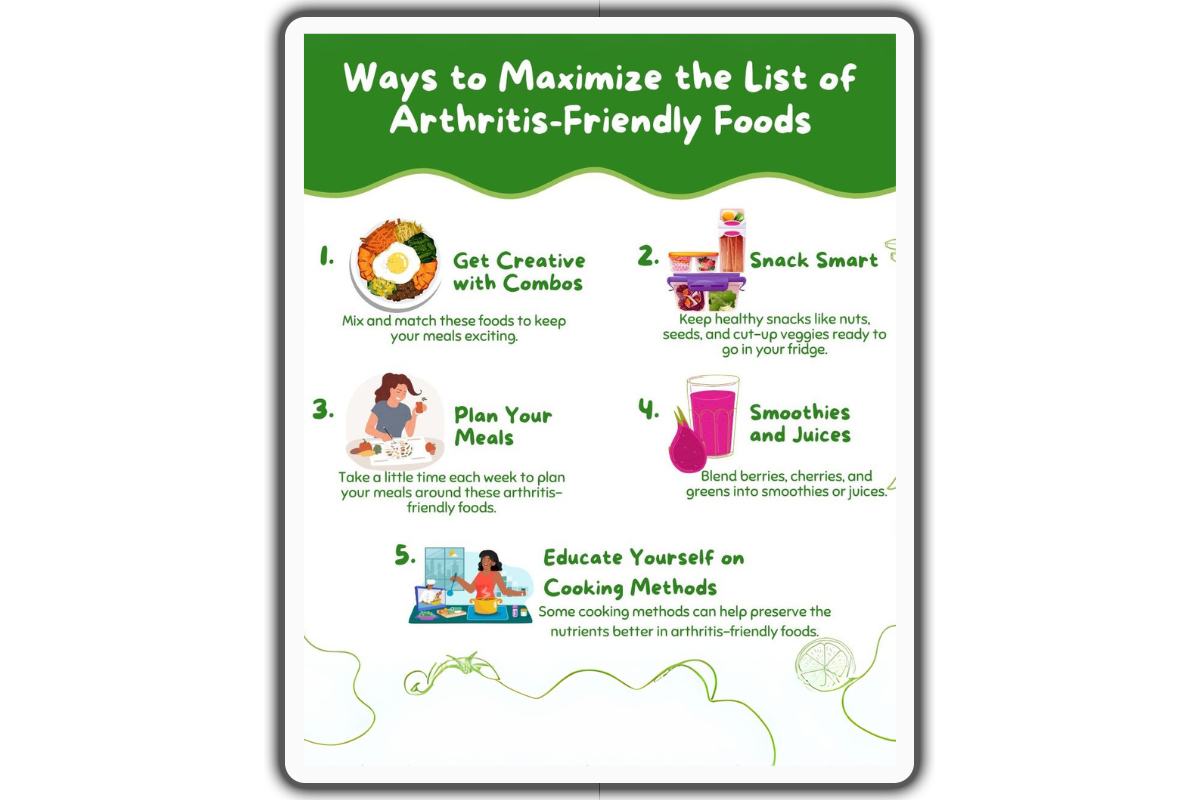Discover The Best Foods For Arthritis You Must Eat
Many think that having arthritis means you can't eat a lot of food, but that's not quite true.
"I often skip going to restaurants because I think I won't find anything suitable to eat" is a common feeling I hear.
Instead of worrying about what you can't eat, I want to show you all the tasty and good foods you can enjoy.
In this blog post, I'll share some great food choices that can actually help with arthritis. Let's discover together how eating the right foods can make us feel better and bring joy to our meals!
The Role of Diet in Managing Arthritis
Eating right is key to managing arthritis, and it’s more important than you might think at first.
Some foods are like natural remedies that help cut down on arthritis pain. Adding these foods to our meals, we fight off inflammation and feel healthier overall.
It feels great to focus on the good foods instead of always worrying about what you can't eat. And once you start enjoying your meals without stress, it changes everything.
This way of thinking not only makes us feel better physically, but it also makes us happier. Each meal becomes something to look forward to, not a problem to solve.
Foods to Enjoy
Let’s explore some fantastic foods that you can enjoy and benefit from to support healthy joints if you have arthritis:
Fatty Fish:
Think salmon, mackerel, and sardines. These aren't just delicious; they're packed with omega-3 fatty acids or heart-healthy fats, which have anti-inflammatory effects similar to those found in fish oil supplements.
Garlic and Onions:
These kitchen staples are powerful in fighting inflammation. A quick tip: toss some garlic and onions into your next stir-fry or soup for an extra flavor boost that’s also good for your joints!
Nuts and Seeds:
Almonds, walnuts, and flaxseeds are not only tasty but also packed with nutrients that satisfy hunger and fight inflammation. Snack on a handful, or sprinkle them over your salad or yogurt.
Whole Grains:
Foods like brown rice, oatmeal, and whole wheat bread are better for you than white bread or pasta because they retain their natural nutrients. Incorporating whole grains into your diet can help maintain a healthy weight, which supports healthy joints. Switching to whole grains boosted my energy levels—give it a try!
Dark Leafy Greens:
Spinach, kale, and collard greens are loaded with vitamins and greatly reduce inflammation. Add them to your smoothies or sautés to get a healthy dose of greens.
Testimonial:
"When I transitioned to a whole food, plant-based diet (not vegan, no processed meat/dairy substitutes), I was able to decrease my inflammation significantly, and my doctor took me off one medication and reduced the other 2 I was taking. I currently have no pain and almost no joint swelling. I’m extremely happy with where I am now, so I haven’t considered eliminating the rest of my medications and relying only on diet, but it definitely made a huge difference.
That being said, my experience is mine, and if I’ve learned anything about RA in the 20 years since I was diagnosed, it’s that everyone’s experience is unique, so you have to find what works for you."-Missmbb
Berries and Cherries:
Full of antioxidants, berries, and cherries are sweet treats that help combat inflammation. I love adding a handful of berries to my breakfast cereal or blending them into a smoothie.
These foods are not only delicious but also help keep your arthritis symptoms in check. Enjoying these can make a noticeable difference in how you feel every day!
Doctor's Note:
"There is no specific diet known to reliably improve rheumatoid arthritis. However, preliminary studies suggest that an “anti-inflammatory diet” (such as the Mediterranean Diet) might be helpful. This diet includes fruits and vegetables, foods with high fiber and whole grains, beans, lentils, nuts and seeds, fish, poultry, and olive oil. Anti-inflammatory diets typically discourage the consumption of highly processed foods such as prepackaged chicken nuggets, hot dogs, processed and cured meats, instant soups, and many baked goods, foods or drinks with sweeteners, such as candy, sodas, juices, cookies, white bread, cereals, white pasta, and white rice or foods made with refined flour. While this is an active area of research, there is no current evidence suggesting that diet alone can replace medications in controlling rheumatoid arthritis." -Dr. Robert H. Shmerling, M.D, Harvard Health Professional
Ways to Maximize the List of Arthritis-Friendly Foods
Incorporating arthritis-friendly foods into your diet doesn't have to be a chore. Here are some simple ways to make the most of these nutritious options:
- Get Creative with Combos: Mix and match these foods to keep your meals exciting. Try combining fatty fish with a garnish of diced garlic, or toss some nuts and berries and dress with olive oil and leafy green salad. The more variety, the better!
- Plan Your Meals: Take a little time each week to plan your meals around these arthritis-friendly foods. This ensures you'll have the ingredients to make healthy choices easily.
- Snack Smart: Keep healthy snacks like nuts, seeds, and cut-up veggies ready in your fridge. When you want a snack, you’ll have quick access to foods good for your arthritis.
- Smoothies and Juices: Blend berries, cherries, and greens into smoothies or juices. This is an enjoyable and easy way to get a concentrated dose of vitamins and antioxidants that help reduce inflammation.
- Educate Yourself on Cooking Methods: Some cooking methods can help better preserve nutrients in arthritis-friendly foods. For example, steaming or raw preparations can maintain more nutrients than boiling.
Foods to Limit (but not Fear!)
When managing arthritis, it’s helpful to be cautious with certain types of foods that might trigger more inflammation or worsen arthritis symptoms. Here’s a list of foods to consider limiting:
- Processed Foods: Often high in sodium and unhealthy fats, processed foods like chips, frozen meals, and fast food can worsen arthritis symptoms.
- Sugary Foods: Cakes, cookies, sodas, and other sugary treats can cause inflammation and should be consumed in moderation.
- Refined Carbohydrates: White bread, white pasta, and pastries can increase inflammation and may contribute to weight gain, which puts more stress on your joints.
- Red Meat: Some types of red meat are high in saturated fat, which can worsen inflammation. Opting for leaner cuts or reducing red meat intake can be beneficial.
- Fried Foods: These are typically high in trans fats, known to trigger systemic inflammation.
- Alcohol: Moderate consumption is key, as excessive alcohol can lead to numerous health issues, including worsened arthritis symptoms.
Frequently Asked Questions (FAQs)
1. Can changing my diet cure arthritis?
While a healthy diet can help manage arthritis symptoms and reduce inflammation, it is not a cure. Dietary changes should complement your medical treatments, not replace them. Always consult with your healthcare provider before making significant changes to your diet.
2. Which foods should I avoid to reduce arthritis pain?
To help manage arthritis symptoms, consider limiting processed foods, sugary treats, refined carbohydrates, red meat, fried foods, and excessive alcohol. These foods can increase inflammation and may worsen arthritis symptoms.
3. How important is exercise in managing arthritis alongside diet?
Exercise is crucial for maintaining joint flexibility, muscle strength, and overall mobility. Combining regular physical activity with a balanced diet can enhance your ability to manage arthritis effectively. Always choose exercises that are appropriate for your fitness level and arthritis condition.
4. Are there specific foods that can help reduce inflammation in arthritis?
Yes, incorporating anti-inflammatory foods such as fatty fish (like salmon and mackerel), garlic, onions, nuts, seeds, whole grains, dark leafy greens, and berries can help reduce inflammation and alleviate arthritis symptoms. These foods provide essential nutrients that support joint health.
Conclusion
Throughout this blog, you’ve discovered the power of positive eating and the benefits of incorporating arthritis-friendly foods into your diet.
Remember, it’s not about dwelling on restrictions but celebrating and enjoying the wide array of health benefits from the foods you can eat. This approach not only helps manage arthritis symptoms but also enhances your overall quality of life.
Adjusting your diet, you can experience significant improvements—fewer flare-ups, more energy, and greater meal enjoyment. The positive changes in your physical health can uplift your spirits and bring more joy to your daily experiences.
However, it's important to remember that diet and exercise should complement your pharmaceutical treatments, not replace them. Incorporating regular physical activity alongside mindful eating can further support your joint health and overall well-being. Always work with your healthcare provider to create a comprehensive management plan that addresses all aspects of your arthritis.
Let this journey of mindful eating and active living open a new chapter where you feel empowered and delighted by the foods that nourish your body and the exercises that keep you strong, all while staying aligned with your medical treatments to support your overall well-being.
References
- Pattison, D. J., Harrison, R. A., & Symmons, D. P. M. (2004). The role of diet in susceptibility to rheumatoid arthritis: A systematic review. The Journal of Rheumatology, 31(7), 1310–1319. https://www.jrheum.org/content/31/7/1310
- Maxwell, J. R., Gowers, I. R., Moore, D. J., & Wilson, A. G. (2010). Alcohol consumption is inversely associated with risk and severity of rheumatoid arthritis. Rheumatology, 49(11), 2140–2146. https://doi.org/10.1093/rheumatology/keq202
- Cutolo, M., & Nikiphorou, E. (2022). Nutrition and Diet in Rheumatoid Arthritis. Nutrients, 14(4), 888. https://doi.org/10.3390/nu14040888



